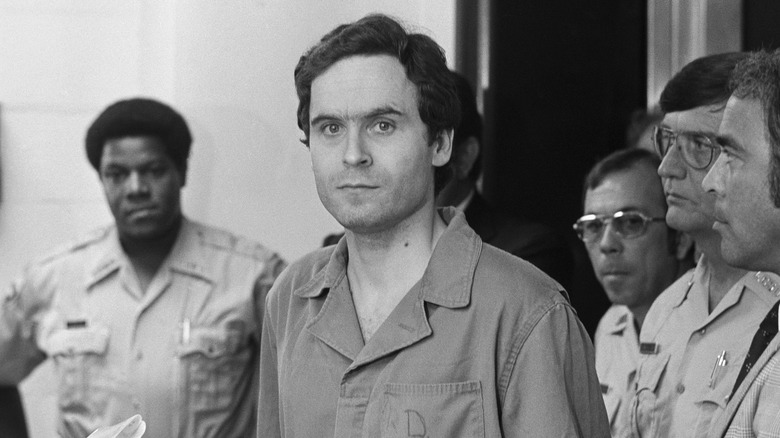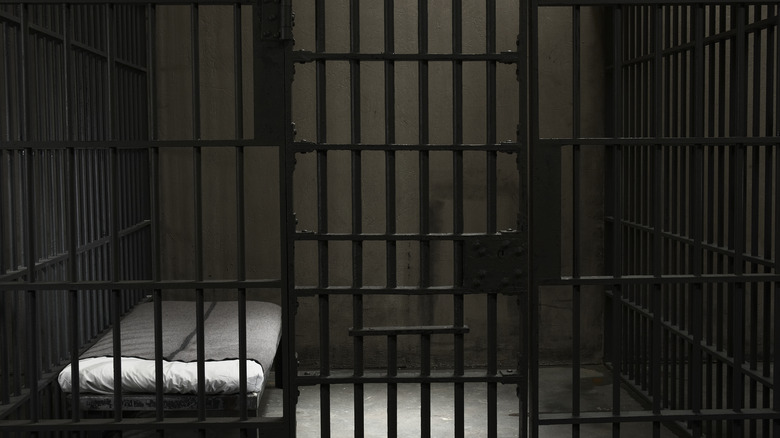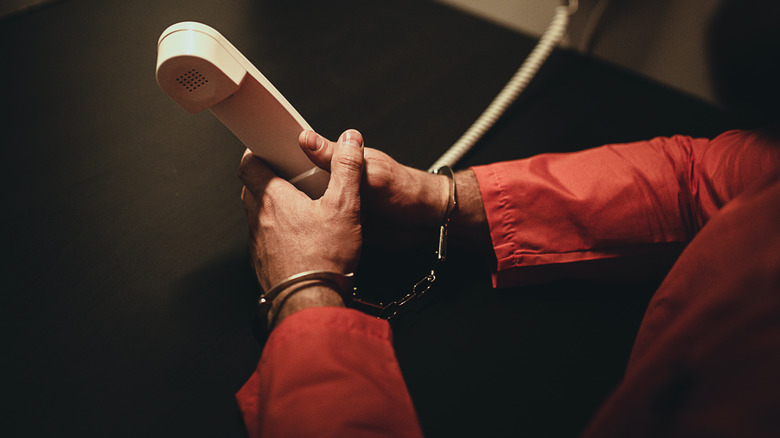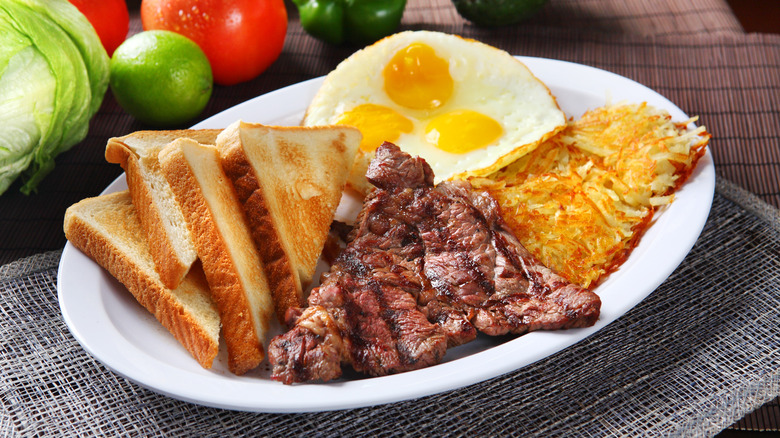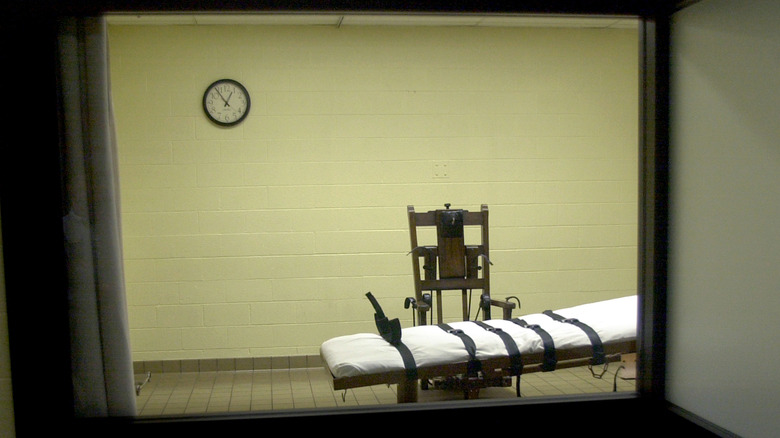Disturbing Details About How Ted Bundy Died
On the morning of January 24, 1989, when serial killer Ted Bundy faced execution, hundreds of people stood outside Florida State Prison chanting, "Burn, Bundy, burn!" At the very least, their desire for justice was understandable. Bundy was not only a serial killer, he was practically the serial killer archetype. Intelligent, well-spoken, and handsome, he'd raped and murdered 20 known victims, per Biography, and admitted to killing 36, but some suspect he killed as many as 100. From 1974 to 1978 he most often hunted young, college-aged women while authorities chased him down. Once he was apprehended in 1978, it took over a decade for him to face execution.
While it's easy to focus on the facts of Bundy's case and the horror that his victims faced, it's much harder to try and get inside Bundy's head — not that anyone would really want to. For instance, did he ever express remorse for his actions? Not according to Bundy — at least not at first. As UNILAD quotes him, "Guilt doesn't solve anything, really. It hurts you. I guess I am in the enviable position of not having to deal with guilt." As The Washington Post quotes, Bundy described guilt as a "mechanism we use to control people. It's an illusion."
Despite such a detached perspective, when Bundy's end came he expressed the same kind of human fear as anyone else. He called his mother twice before death, didn't touch his last meal, and sent his love to his family and friends. He even spent the night before his execution crying and praying in his cell.
Bundy spent the night praying and crying
At this point, Ted Bundy is more of a monster in our collective historical memory than a person. Whether or not he, in his last hours, is due any sort of common human sympathy is up to the reader. And while it's admittedly hard to think of him expressing terror and remorse, this is precisely how it seems he spent the night before his death. Bundy didn't sit and stare at the wall without feeling leading up to his January 24, 1989 electrocution. By all accounts, he spent the night "weeping and praying," as the Los Angeles Times reported at the time. Whether or not he was weeping and praying for his own soul or the souls of his victims is anyone's guess.
That being said, Bundy did give an interview with psychologist James Dobson before being executed that more or less reflects a contrite attitude — at least if we believe what Bundy said. In the interview, he describes having woken up from being "possessed by something so awful and alien." He said that he remembered being responsible "in the eyes of the law, and certainly in the eyes of God." Speaking of his murders and other crimes, he also said that he was "horrified" that he was "capable of doing something like that." If Bundy indeed came to some sort of penitent revelation before facing death, then such self-awareness should prove far more disturbing to think about than any details regarding how he actually, physically died.
Bundy called his mother twice
It's said that nothing is as potent as a mother's love. In Bundy's case, that love was apparently potent enough to shroud Bundy's mother, Eleanor Louise Cowell, from the truth — at least for a while. As Women's Health quotes an old 1980 article from The News Tribute, Cowell told the paper, "Ted Bundy does not go around killing women and little children!" She also defended her son, saying, "And I know this, too, that our never-ending faith in Ted — our faith that he is innocent — has never wavered. And it never will."
Eventually, it seems that Cowell came to accept her son's actions, at least following Bundy's confession. After that, Cowell still kept in contact with her son and spoke to him twice on the phone before he was executed. We have no way to know what they talked about, of course, but we do know that Bundy and his mother shared a close, even possessive relationship. As a child, Bundy grew jealous of his mother's burgeoning relationship with her future husband, Jonnie Bundy, who eventually adopted Ted and gave him his last name. This, by the way, came after Bundy grew up thinking that his mother was his sister, as Cowell was seemingly ashamed of being a single mother. Such a relationship, when combined with visions of Bundy phoning his mother before death, paints a portrait possibly a bit more disturbing than a mother simply comforting a son.
Bundy wouldn't touch his final meal
Even those unfamiliar with the specifics of executions know that inmates receive a last meal of their choice. Some people, like Gary Carl Simmons, ordered a final meal of nearly 30,000 calories in 2012, including two pizzas, McDonald's French fries, two pints of ice cream, and much more. Others, like Velma Barfield, asked for nothing more than a Coca-cola and a bag of Cheez Doodles before her end came in 1984.
Ted Bundy, however, didn't make any specific requests. And so, he was given Florida State Prison's default final meal, something akin to a breakfast you might find in front of a hefty eater in a New England diner: steak, eggs, hash browns, toast with jam and butter, coffee, and juice. But rather than chowing down, Bundy didn't touch it at all.
By itself, it's not necessarily troubling that Bundy didn't eat his final meal. In fact, some people might cheer or jeer at the fact, or say that Bundy didn't deserve the food. But when taken in light of the rest of Bundy's final hours — spent crying, praying, calling his mother, etc. — it's a bit disturbing to imagine him, or anyone, sitting in a cell awaiting an appointed death time, terrified and possibly nauseous, unable to lift a hand to touch one's food. That is if this is the reason why Bundy didn't eat.
Crowds cheered on Bundy's death
It's one thing to be relieved or grateful that a highly dangerous, psychopathic person has been removed from human society, and another thing entirely to cheer on that person's death like ancient Romans in the Colosseum howling for the blood of a gladiator. Of course, those personally affected by Bundy's actions — like the family members of his victims — had far more of an understandable reason to express joy over his execution than others. But for 500 random members of the public to care enough to travel to, and gather outside of, Florida State Prison to gleefully await the happy news that Bundy had had 2,000 volts of electricity cast into his body? Such behavior casts a disturbing scenario in an even more disturbing light.
We mentioned that the crowd outside of Florida State Prison — some of which presumably had camped out overnight, since Bundy was executed at dawn — chanted, "Burn, Bundy, burn!" in the hours leading up to his death. When a witness to Bundy's execution ran outside to inform the crowd of what had happened, people cheered, sang, banged pans together, and hugged each other. Policeman David Hoar no doubt voiced what others were thinking when he said, "I wish I could have been the one flipping the switch," per the Los Angeles Times. Things get gruesome and morally complicated, indeed, if we believe that Bundy was contrite and prayerful while such thoughts and feelings were brewing outside.
Bundy was electrocuted for 1 minute
Finally we come to Bundy's actual moment of death. When Bundy's time came he was escorted to his execution looking "ashen," as the Los Angeles Times described in 1989. He sat down in Florida State Prison's wooden electric chair, his typical bravado completely drained away. His arms and legs were strapped into place as he stared through a glass window at 42 people on the other side, including some of his prosecutors. He nodded to the people whom he recognized, mouthed something inaudible, and bowed his head. Like others facing electrocution, Bundy's head was shaved. It's typically the case that those facing electrocution have their heads shaved, along with the calf of one leg, to permit electricity to be better conducted. His shaved head also glistened from ointment, which helped electrodes transmit current through his body.
When asked if he had any last words, Bundy simply said, "I'd like to give my love to my family and friends." Soon after, Bundy's mouth and chin were covered with a heavy strap. Next, executioners affixed a metal-fitted electrode to the top of his head with an attached black veil that hung down to cover the notorious face that managed to charm so many. When the electrocutioner pushed a button, Bundy's hands and body tightened, and smoke lifted from his leg. A minute later, the 2,000 volts of current were switched off and a doctor listened for Bundy's heartbeat. At 7:16 a.m., right around when the sun came up over Florida, Bundy was pronounced dead.
